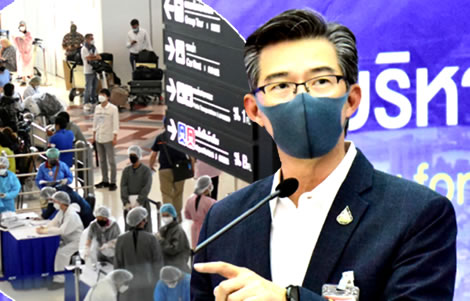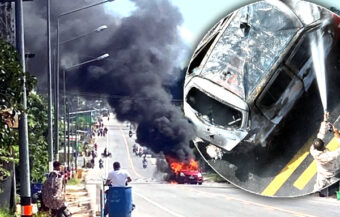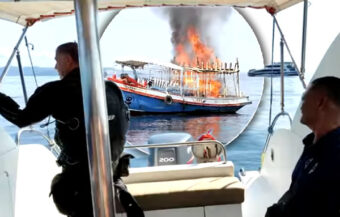The Centre for Covid-19 Situation Administration (CCSA) on Friday did not go as far as public health officials had demanded by banning alcohol sales nationwide. Nonetheless, it is believed that a further tightening of regulations has begun. Business leaders are warning the government the country cannot deal with further lockdowns with confidence among foreign tourists already damaged by the suspension of incoming tourism with 87% of potential travellers rejecting the complicated Sandbox schemes.
Business leaders within Thailand’s foreign tourism industry and wider business community on Friday were apprehensive about the government’s moves to tighten public health laws and in particular to indefinitely suspend the popular ‘Test and Go’ entry regime which had, in the previous two months, breathed life into the country’s dormant foreign tourism industry spurring hope of economic recovery in 2022. On Friday, it was described by Dr Taweesilp Visanuyothin of the Centre for Covid-19 Situation Administration (CCSA) as a ‘loophole’ that left Thailand vulnerable to the Omicron virus storm now brewing.

The government, on Friday, confirmed that there would be no prospect of an early return for the ‘Test and Go’ entry regime.
Figures just released showed that the scheme, the most successful and least restrictive approach offered to applying foreign tourists from November 1st to December 22nd, helped generate 416,160 visitors to Thailand for the year up to the 31st December 2021 with nearly three-quarters of these coming in the last two months after the country reopened.
The ‘Test and Go’ entry option generated over 71% of arrivals into the kingdom in the last two months of the year.
‘Test and Go’ entry option suspended from December 22nd and now appears to be off the table for good
The highly successful scheme with only one-night quarantine for visitors to receive a PCR test was open to 63 countries before being suddenly suspended on December 21st last with a block on approvals coming into effect on December 22nd last.
On Friday, following a crucial meeting of the Centre for Covid-19 Situation Administration (CCSA) during which Minister of Public Health Anutin Charnvirakul and public health officials were reported to have pushed hard for suspension of all alcohol sales nationwide, a spokesman for the administrative agency coordinating government operations under the emergency, Dr Taweesilp Visanuyothin, confirmed that the suspension of the ‘Test and Go’ regime was now indefinite.
‘A loophole for the virus’ says top official
Dr Taweesilp went further and described the entry regime for foreign tourists as a vulnerability that exposed Thailand to the Omicron variation of COVID-19 which is now being transmitted locally and in a widespread manner in over 55 provinces of the kingdom.
‘Test & Go is a loophole for the virus to enter the country,’ Dr Taweesilp told reporters on Friday.
Concession offering: approved travellers prior to December 22nd can enter up to Saturday January 15th
In a concession to the already severely weakened foreign tourism industry which had just been finding its feet when the end of December bombshell was dropped and to whom Friday’s further restrictions and confirmation of the Test and Go’s indefinite suspension is a painful body blow, officials confirmed that the government has extended the cut-off point for prior approved travellers through ‘Test and Go’ before December 22nd last under the Thailand Pass system to enter Thailand up to Saturday 15th January 2022.
This had earlier been set for Monday, January 10th and it is believed that it will facilitate a further 10,000 foreign tourists or visitors to enter Thailand under the more relaxed and popular entry regime.
Response from the business sector is mixed and ambiguous with fears for an already fragile economy
The move by the government to control the potential spread of Omicron which is now widely believed to be behind the surging numbers of the last few days is being met with a mixed and apprehensive response from business leaders with some warning about excessive measures at this time and the need to protect an already fragile economy.
Thanet Supornsahasrungsi, the President of the Chonburi Tourism Council, on Friday noted that there were 47,737 approved travellers under the Thailand Pass system scheduled to arrive in Thailand after January 10th.
He warned that these cancelled visitors alone could see tourism business owners lose ฿3.34 billion.
‘Test and Go’ suspension will cost billions
His concerns were echoed by Chamnan Srisawat of the Tourism Council of Thailand (TCT) who warned that the continued suspension of the popular ‘Test and Go’ entry regime will cost his members at least ฿7 billion in the short term.
Mr Chamnan also warned that the sudden change of heart and effective cancellation of the scheme will damage confidence among travellers in the future who may be considering Thailand as a holiday destination.
This is something that will take a long time to recover from as efforts to revive the industry last year had already shown despite their relative success.
His body estimated at least a 50% drop in terms of income compared to even the levels seen in November and December, an outcome that will effectively kill off Thailand’s hopes this year for any recovery of the defunct foreign tourism industry, a critical financial prop for the economy and household income.
Cancelled entry regime was a response to plunging household income in 70% of Thai households
The Tourism Council of Thailand released data in October which showed that no less than 70% of Thai households had lost 40% of their income since the COVID-19 virus crisis began in early 2020.
Following this, the Prime Minister went on live television to announce a stronger and fuller reopening of the kingdom to foreign tourism which saw the ‘Test and Go’ regime emerge which appeared to be driven by the Prime Minister’s Office at that time.
PM’s reopening order-only the beginning of the end of this cataclysmic crisis for Thai tourism
The scheme exceeded the expectations of foreign tourists compared to the more complicated and conditional schemes presented by the Tourism Authority of Thailand.
Tourism Council boss calls on the government to think carefully about imposing further economic restrictions on an already struggling economy
On Friday, Mr Chamnan appeared to call on the government to act cautiously and with restraint despite the accelerating number of COVID-19 cases driven by the Omicron wave which saw a jump on the day to 7,526 cases, a nearly doubling of cases in 48 hours.
‘The flip-flop on our reopening policy during the high season directly impacted opportunities for the rest of this year,’ Mr Chamnan affirmed on Friday, a view which chimed with a Bank of Thailand warning before Christmas when it raised fears that with rising case numbers driven by Omicron, the government may be forced to take actions which deeply and negatively impact both the country’s performance in the short term and confidence which will see any prospect for growth or recovery in the opening six months of the year wiped out.
It should be said that Thailand, since 2019, has not seen any substantial growth despite a massive 6.1% GDP contraction in 2020 with only 0.9% growth projected to the end of last year.
Thailand’s growth rate for 2019 was also subdued at 2.4% after exports were hit by the US-China trade war.
More balanced approach is needed given milder clinical outcomes confirmed from Omicron in tests
Mr Chamnan urged the government, on this occasion, to balance the need to protect the economy and public health more equally, given increasing reports that this virus variant is milder in terms of clinical outcomes.
However, this approach was castigated on Friday by Dr Tedros Adhanom Ghebreyesus, the Director of the World Health Organisation (WHO) who warned that the sheer caseload and volume of cases generated by this new strain threatens to overwhelm health services worldwide.
Dr Tedros also in mid-December warned all countries that Omicron could not be held in check by border controls and was already in most jurisdictions.
‘Omicron is spreading at a rate we have not seen with any previous variant,’ the WHO boss said during a briefing in Geneva. ‘Seventy-seven countries have now reported cases of Omicron. The reality is that omicron is probably in most countries, even if it hasn’t been detected yet.’
Tourism business owners think the unthinkable, the Omicron storm may bring with it good news
His latest statement came just 24 hours after the Incident Manager of the World Health Organisation (WHO), Dr Abdi Mahamud, described the Omicron variant as potentially revealing good news with a decline in death rates from surging cases. Dr Mahamud stressed, however, that this will require further research and study.
Difference of emphasis appears between responses from the business community and health officials
It does appear that there is some division being opened up between business leaders and public health officials at the onset of this new wave.
On Friday, public health officials including the Minister of Public Health Anutin Charnvirakul were making no secret of their insistence and demands that stronger curbs must be placed on economic activity and with a particular focus on tourist-related operations at this time.
Nonetheless, the outcome of Friday’s Centre for Covid-19 Situation Administration (CCSA) meeting appears to reflect more of a wait and see approach by the government despite the well-publicised calls by Minister Anutin before Friday’s conference of top officials for all alcohol sales to be scrapped at this time.
Public health officials demand robust and quick action to protect public health from this impending Omicron wave seen by officials here as kickstarted by alcohol
Before the meeting on Friday, the Minister of Public Health Anutin and senior officials let it be known that they were taking action to step up measures against the Omicron outbreak and would be making sweeping proposals to the powerful government agency in the light of the developing emergency situation.
Measures touted included a tightening of quarantine for all arrivals beyond the elimination of the ‘Test and Go’ regime and a ban on the consumption of alcohol in restaurants.
In previous statements, Minister Anutin made no secret of his frustration at the behaviour that had arisen since the resumption of foreign tourism activities which a huge majority of western tourists see as intertwined with alcohol consumption.
Even at the outset of the country’s reopening in November, Minister Anutin had warned that he did not want to see a return to crowded and rowdy bar scenes which many regular foreign tourists to Thailand associate with their holidaymaking activity in the kingdom.
Focus is on tourist-related activity nationwide
In the last week, public health officials have zeroed in on this activity as the basis for the growth of the Omicron virus wave across Thailand as it has also been with previous waves.
One official noted the practice of bar patrons moving from venue to venue in the course of one night was further fuelling the surge.
Health officials ask for a review of the list of 63 countries allowed to enter without quarantine on Covid fears
Thailand again signals move away from mass-market foreign tourism with falling numbers being seen
The opposition by the Ministry of Public Health to foeign tourism-related activities was also clear even before the detection of Omicron in Thailand.
Minister of Public Health Anutin makes no apology for prioritising public health, he accepts that Omicron could be different from previous virus waves
At the end of November, it was reported that public health officials had requested further curbs on the ‘Test and Go’ regime while Mr Anutin, the Minister of Public Health, at that time, expressed his frustration at reports of the resumption of pre-pandemic bar culture in Bangkok with reports of many establishments operating illegally or on the pretence of providing a restaurant service.
This came even as Prime Minister Prayut Chan ocha and the Centre for Covid-19 Situation Administration (CCSA) promised to look at the plight of those working in the country’s nightlife industry.
Nightlife to reopen on a certified basis as officials try to balance public health and the economy
On Friday, Minister Anutin accepted that the outcome for this latest wave which is rising fast, may be different from previous waves but it was too early to say.
However, he made it clear that his policy was one of being proactive and putting public health front and centre.
All arrivals into Thailand must face quarantine
Calling for all arrivals into Thailand to be subject to quarantine he said: ‘We will not wait seven to 10 days for an actual number of infections to emerge after the festive holiday.’
He indicated that there could well be further moves to rein in activity ahead despite raised hopes of a milder virus with lower death rates.
‘The number of deaths will be low due to large numbers of people already getting vaccinated,’ he explained. ‘We will evaluate the situation before making a decision on whether to shutter some activities.’
On Thursday, the Ministry of Public Health raised the COVID-19 alert level from three to four meaning that alcohol sales nationwide can now be banned by order.
The fast-moving situation was highlighted by the permanent secretary of the Ministry of Public Health Kiattiphum Wongraji.
Fast-moving and escalating situation with Pattaya and Chonburi emerging as a hotbed of infection according to official figures on Friday and Saturday
‘We are seeing a fast outbreak this time,’ Mr Kiattiphum disclosed. ‘There are several provinces that have rising daily cases including 769 cases in Chon Buri and 454 in Bangkok.’
On Friday, further evidence to suggest that this Omicron outbreak was linked to alcohol consumption and revelry was emphasised further when Chonburi province emerged as one of the hotbeds of infection driving this latest wave with 1,342 cases alone on Friday, half of which were in the Bang Lamung district including Pattaya.
On Saturday, Thailand recorded 8,263 cases with 96% of cases transmitted locally. This was up from 7,526 on Friday.
Despite this, the Centre for Covid-19 Situation Administration (CCSA) did not completely pull the plug on alcohol sales in key tourist hotspots despite being strongly urged to do so by public health officials on the basis that it is a key driving factor behind this latest wave.
8 key tourist provinces spared alcohol ban for now after Friday’s CCSA meeting although further tightening measures are expected
On Saturday, it was announced that 69 provinces will see a ban on alcohol being served in restaurants from Sunday.
The CCSA on Friday specifically excluded eight provinces from further restrictions including a ban on alcohol sales.
These are Bangkok, Chon Buri, Kanchanaburi, Krabi, Nonthaburi,Pathum Thani, Phangnga and Phuket.
It is not known however how long this relief will last.
The business community is watching the situation closely and while some industry leaders are quick to commit to cooperation with the government in making decisions on public health grounds, this time the response is more ambiguous.
Chamber of Commerce opposes lockdown measures
On Friday, Sanan Angubolkul of the Thai Chamber of Commerce made it clear that his organisation would oppose any plans to introduce lockdown measures at this time.
‘The Thai Chamber of Commerce disagrees if the government reimposes lockdowns on all activities in the country,’ the business boss said.
‘Any more lockdowns will not only cause huge damage to the economy but will also dampen public confidence. Several sectors have just regained their hope of restarting and are going ahead with their businesses this year, and people are resuming their normal lives.’
He told the government that if another lockdown occurs then any progress made since late last year to recover the economy will be lost again.
‘Any further lockdown would put the country back at square one.’
Extension of unpopular sandbox schemes to four other areas meets with a lukewarm response
On Friday, the Centre for Covid-19 Situation Administration (CCSA) did agree to the extension of the Phuket Sandbox schemes to other areas of Thailand noticeably Krabi, Phangnga, Surat Thani and the islands of Ko Tao, Ko Samui and Ko Phangan.
While this received a welcome from business leaders, it was a lukewarm one given the details and preparation required to organise such schemes and their growing unpopularity not only with foreign tourists but international tourism operators who view them as unwieldy and unreliable for travellers given their history and track record.
The very low numbers being achieved for such sandbox schemes including the Phuket Sandbox which has only achieved a marginal percentage of visitors compared to normal tourist volumes is testimony to this.
Only 13% will visit Thailand under the kingdom’s demanding entry process with 2021 economic growth at stake
A Thai Examiner survey in August and September 2021 showed only 13% of prospective foreign tourists would be open to availing of such schemes.
‘Test and Go’ demonstrated the kingdom had found the right approach at least for the economy
The ‘Test and Go’ scheme accounted for over 71% of arrivals in November and December when incoming tourists numbers moved upwards to 200,000 visitors a month.
Indeed, the figures for the opening 5 days of January showed 26,402 arrivals despite the suspension of the ‘Test and Go’ regime from December 22nd which demonstrated the kingdom had found the right approach that has now been derailed by the onset of the Omicron virus wave which is threatening record levels of infection.
It is understood that a proposal was made to the Centre for Covid-19 Situation Administration (CCSA) on Friday to cancel the ban on arrivals from 8 countries in Africa imposed at the onset based on fears about the Omicron strain in November while tightening quarantine rules for all visitors at this time.
US, UK and Europe do not impose quarantine on vaccinated arrivals despite a tsunami of Omicron infections being reported in the last few weeks
Entry regimes worldwide vary substantially during this latest Omicron wave of the virus which has already seen over 1 million cases detected in a 24 hour period in the United States which is opting to battle through this latest virus storm by taking sensible precautions but without panic.
Vaccinated travellers can enter both the United States and the United Kingdom without quarantine but are subject to tests while Australia’s borders still remain closed to non-citizens except in special cases requiring an exemption.
In the case of the European Union, vaccinated travellers may enter but it will be later in January before the European Union practically and conveniently recognises the vaccination status of Thai citizens and those vaccinated in the kingdom automatically through the European Union’s Digital Covid certificate programme.
Economic repercussions as 2022 starts badly
On Friday, the Thai baht dipped against the US dollar due to both fears on the economic front with the sliding suspension of foreign tourism activities and fears that the impending Omicron storm of infection will see further economic limitations.
However, the key reason for the slip in the Thai currency, one that has seen it fall by 1.3% so far in January, is confirmation that the US Federal Reserve will be tightening interest rates in 2022 as well as a tightening of money supply to ward off worrying inflationary pressures.
The Federal Reserve has warned the market in recent days that even faster rate hikes may be on the cards.
This pending tightening of money supply and a deteriorating economic situation in China are all factors that may impact the Thai economy which is beginning 2022 on the worst possible note.
Join the Thai News forum, follow Thai Examiner on Facebook here
Receive all our stories as they come out on Telegram here
Follow Thai Examiner here
Further reading:
Tourism business owners think the unthinkable, the Omicron storm may bring with it good news
Minister suggests that ‘Test and Go’ now paused entry regime may be restarted in the New Year
Omicron nightmare for already troubled tourism sector: plan to suspend ‘Test and Go’ entry route
Omicron has arrived in Thailand but top officials believe they can manage an escalating situation
Thailand pushes ahead with foreign tourism drive, may defer switch to antigen testing over Omicron
Health officials asks for a review of the list of 63 countries allowed to enter without quarantine
Nightlife to reopen on a certified basis as officials try to balance public health and the economy
Thailand Pass is being upgraded but passenger stress stories continue with cancellation threats
Tourism reopening may lose momentum as government pivots back to public health priorities
Incoming passengers vent frustration at problems and bugs with the Thailand Pass system this week
Russian and Indian travellers unhappy at entry rules for November 1st, call for simpler plans
46 countries green-lighted as Thailand’s tourism business is set to take off from November 1st
Bright lights may be turned on again for foreign tourism as hated Certificate of Entry is to be axed
TAT boss: quarantine remains for 1 day to test all visitors, no going back to old tourism pub scenes
PM’s reopening order-only the beginning of the end of this cataclysmic crisis for Thai tourism
Tourism chief again plans to open up Thailand’s rock bottom tourism industry to cryptocurrencies
Dysfunction hits reopening of Thailand to tourism as Health Minister dismisses October 1st date
New normal tourism may see foreign and local tourists segregated at Pattaya tourist attractions
Rising prospect of GDP contraction for 2021 may see government breach the legal public debt limit
Economic fears rising as Thailand faces a bigger crisis than 1997 with rising job losses and debt
Baht falling with confidence in Thailand waning as foreign tourism closure and virus drive funds out
Central bank to lower GDP growth forecast as its attention turns to private sector debt management
Failure to pass the ฿500 billion borrowing decree could lead to the dissolution of parliament
Industry leaders and central bank all warn that foreign tourism must return to avoid a collapse
Fact – only 6,556 visitors arrived in Thailand last month compared to 3.95 million in December 2019
Desperate foreign tourism business concerns are clinging to straws as they try to survive the crisis
Challenge of the virus and closure to tourism leads to major long term changes in the Thai economy
Finance Minister says economy must pivot away from tourism with a switch to S-Curve industries
Strengthening baht predicted as investors bet on a reopening of Thailand to mass tourism in 2021
Thailand facing a credit crunch as 3rd virus wave craters the kingdom’s economic recovery plans
3rd virus wave now spells not just economic loss but financial danger as kingdom’s debt level rises
Still time to avoid lockdown says Health Minister as 3rd virus wave dwarfs all infections to date
Reopening of Phuket still not officially approved although it is the ideal test for a broader move


















